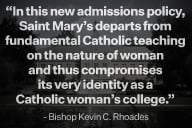You have /5 articles left.
Sign up for a free account or log in.
One women’s college is making sure that all students who want a degree can earn one.
Alverno College, an all-women’s institution in Wisconsin, is phasing out its once popular weekend courses in favor of a hybrid option for students, a move the college’s president said will allow the student body to better balance personal and professional demands while still pursuing a degree.
President Mary Meehan said when the weekend program at Alverno began more than 40 years ago, the institution would see women travel from as far as Colorado to attend the courses. But over the years, students found working full-time during the week and giving up weekends to be too demanding. Enrollment numbers fell from about 1,000 a decade ago to roughly 100 now, and the college started exploring other options.
The roughly 100 students in the weekend classes can continue in their programs, but no new students will be accepted. Instead, students can study business, communication or liberal studies with a weekly night session and online lessons supplemented by outside group work.
Seventy-five percent of Alverno’s student body are first-generation students, and the college has recently experienced a significant increase in enrollment, primarily in graduate studies, while other institutions throughout the country have struggled to keep their numbers up.
“The fact that kept coming up again and again was the students were saying, ‘we need a more flexible time frame,’” Meehan said. “And with the demands people have in their lives personally and professionally, to give up Friday night, Saturday and Sunday morning and then head right back to work, they would rather have the flexibility of going in one night and doing more of it online.”
She said that the typical student at Alverno works more than 30 hours a week -- including students who come to the college straight out of high school -- and this hybrid program gives them an opportunity to earn a living and a degree at the same time.
The online course work, which was created in-house at Alverno, means that -- barring the in-class sessions -- students don’t have to worry about being in a certain place at a certain time to cover class material, a restriction that hurt those juggling multiple responsibilities.
Meehan said officials at the college first struggled on how to reconcile the college’s ability-based curriculum, which grades students based on how they perform in simulations, with the online courses, but determined that those assessments will take place during the in-person classes.
She added that the college has also stayed in touch with roughly 500 students who left the college, and after introducing them to the new program, officials received a “positive” response.
“We invite students back, so it’s really important to us that we help them graduate in whatever way we can,” Meehan said. “So this is another way to help those students to degree completion.”
Matthew Chingos, the research director of the Brookings Institute’s Brown Center on Education Policy, who has done studies on the effectiveness of hybrid programs, said he has found that the alternatives help students to learn the same amount of material in a hybrid statistics course as they would in a traditional classroom, but in a shorter amount of time.
He was quick to note that his research was only on certain kinds of courses and the effectiveness of a hybrid course depends on a number of factors, including the subject of the class.
He added that caution should be used with hybrid courses because unmotivated students will simply use the online lessons and not show up to the in-person class time, or a student will miss too much of the online course work and be too embarrassed to attend the other session.
“It helps with engagement, it helps with accountability,” Chingos said of the in-person sessions.
Kim Bobby, the director of the American Council on Education’s Inclusive Excellence Group, said she was impressed with Alverno’s efforts to reach more populations of women, not just traditional students who could make it to campus to take classes during the day.
She said the topics Alverno was covering in its hybrid programs can help the women who are already working or hope to join the workforce learn skills that will apply directly to their career aspirations.
“I think looking at the student body and then looking at what the workforce is looking at, a lot of it is focused on leadership,” Bobby said. “We need good leaders across all sectors, and in these three sectors women leaders are currently underrepresented, and this is helping to close some of those gaps.”
Lotte Bailyn, a professor of management emerita at the Massachusetts Institute of Technology who has done extensive research on the role of women in higher education, said because over all there are higher percentages of women pursuing bachelor's degrees than men, higher ed is already more customized for women than men.
She said when looking at Alverno’s program, the college didn’t have to just consider women, but working women or mothers who would be the best fit for a hybrid course.
“I think what’s important is the particular group this college is attracting. I don’t think it’s the normal education,” Bailyn said.








